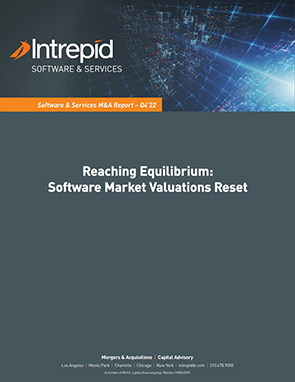2022 was a turbulent year. The year ended with public equity markets leveling off after falling from 2021 highs, interest rate hikes from the Federal Reserve nearing an end, inflation dropping off mid-year peaks, and geopolitical tensions having turned to outright war. The stock market felt the impact, with the S&P 500 and NASDAQ posting 19.4% and 33.1% losses in 2022, respectively. All things considered, Q4 ended relatively flat, with market data pointing to positive momentum. Deal transaction values matched last quarter while still staying significantly above early 2020 figures. Public software company multiples rebounded towards the end of the year and exciting take-private acquisitions took place, suggesting there is now an intersection between private and public valuations.
The decline in public markets poses an interesting question: Are overvalued public valuations coming down to fairly-priced, private market valuations, or have public company valuations overcorrected? We firmly believe in the former, and the support for the answer lies in the current state of the public markets. Although the IPO/SPAC market collapsed 94% compared to 2021, take-private activity has increased. For example, Thoma Bravo made four acquisitions of public companies in Q4 2022, where each company was down, on average, 44% YTD to each acquisition’s announcement. Despite market conditions, these acquisitions contributed to the stabilized level of buyouts in Q4 2022.
In Q4 2022, buyout activity ticked slightly lower while exits significantly slowed. Last year, PE firms exited 1,274 U.S. companies for a cumulative $296 billion, roughly 28% and 66% lower, respectively, from 2021’s record-setting levels. Nevertheless, the availability of dry equity powder remains near all-time highs, with the difference now being that there is less pressure to deploy capital as rapidly compared to early 2022. This available capital is crucial to growth-stage companies looking to maintain prior round valuations in the new environment.
With heightened interest rates and a tight credit market, the topic of capital efficiency is back at center stage. VC-backed companies that once enjoyed easy access to capital at lofty valuations now face new challenges with cash management. Those who have burned through or are burning through their last raise will struggle to raise the next round. Beyond the prospects of raising capital, companies face the complex task of maintaining attractive growth metrics while cutting excessive costs to extend cash runways.
On the other hand, further rate hikes and the onset of a mild recession as some Wall Street analysts predict could dampen valuations or cause buyers and sellers to once again diverge. While the future is as always uncertain, quality companies that continue to perform, with defensible theses, have strong odds for success. As overall multiples remain high, investors have capital to deploy, and some large transactions are completed, companies considering an exit should certainly begin to prepare for market.

To read the full report, click here.


